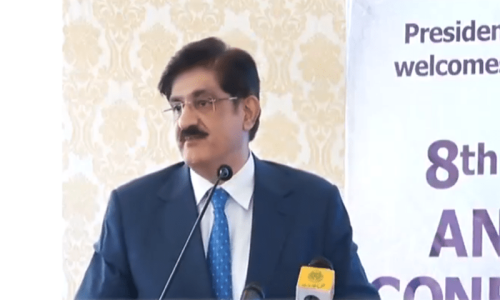
KARACHI: A book titled Lyari Ki Adhuri Kahani by Ramzan Baloch was launched at the Karachi Press Club on Friday evening.
The unassuming author in his address to the attendees, which included a big number of media personnel, said his book did not have literary flair, nor did professionalism.
But, he said, if his book was being talked about, particularly among the youth, it’s because it discussed the glorious past of Lyari. He said at a time when there was socio-political suffocation in the area, memories of a pleasant past helped, which was why the book was getting popular.
Ramzan Baloch said Lyari was not an isolated island; it was part of Karachi. If there used to be cultural and social activities in Lyari, it was due to the fact that the entire Karachi was like that. “Who can forget the NSF? Who can forget Mairaj Mohammad Khan?” he reasoned. If Karachi was doing fine (saheeh tha), Lyari was doing fine, Pakistan was doing fine, he said. He said in order to see where things went wrong, one should look at Islamabad.
Mr Baloch said in recent past unsavoury reports came from Lyari. He said the people living in Lyari thought that some section of the media overplayed them which damaged the secular character of Lyari. Today, he said, people were trying and struggling to reclaim that character. He said there was no need for being despondent as time would come when there would peace in the area.
Journalist Siddique Baloch, who presided over the launch, said he had known the author from his childhood. He’s a humanist, he said. He said what was being referred to as Islamabad, journalists called it the establishment. He said the establishment did not like the secular culture that existed in Lyari. He said when Rangers raided houses in Lyari they lined up people and gave them the murgha punishment. It’s a humiliation, he said.
Mr Baloch said in the past the police in Lyari were part of the community. After the formation of One Unit, the community police disintegrated. People (police) from the outside came and disrupted the harmony of the neighbourhood. They created criminal gangs which gave them a regular income, he said.
Highlighting the historic significance of Lyari, Mr Baloch said political leaders of the subcontinent (Motilal Nehru, Jawaharlal Nehru, etc,) used to come to Chakiwara Chowk to address the public. Gandhi came three times, he said. “Lyari was the headquarters for political thinking,” he claimed.
He lamented that the media humiliated those who lived in Lyari and ignored their contribution to society.
Journalist Nadir Shah Adil said when he asked someone by how many ways one could communicate with Balochistan, he replied by road, air and sea. He responded that there was a fourth way to do that, which was the poet Ata Shad. Similarly, he said, in order to know or communicate with Lyari, he would recommend Ramzan Baloch. He said the author, much like Ibn-i-Safi, had used a simple and clean language in writing the book. He said Mr Baloch had provided the reader with valuable information. He confessed that he himself did not know about some of things mentioned in the book. He said it was not an incomplete story (adhuri kahani) of Lyari because it was about Karachi, about the time when Lyari was a peaceful place. And if it was incomplete, he said, then the writer himself should complete it.
Prof Dr Tauseef Ahmed Khan, who conducted the programme, said there was a wealth of information in the book. The author had not only narrated the story of his family but also of the various social and political movements that emanated from Lyari.
Usman Baloch, Zaib Azkar Husain, Saeed Sarbazi, Ahmed Iqbal and Rahim Yousufzai also spoke.
Published in Dawn, January 23rd, 2016













































Dear visitor, the comments section is undergoing an overhaul and will return soon.